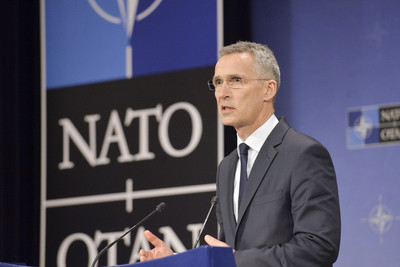
NATO says it won’t send troops to Ukraine if Russia invades Press Conference by NATO Secretary General Jens Stoltenberg. (NATO/Released)
This article was originally published by Radio Free Europe/Radio Liberty and is reprinted with permission.
NATO Secretary-General Jens Stoltenberg has said that the Western military alliance will not send combat troops to Ukraine in the event that Russia invades the country.
“We have no plans to deploy NATO combat troops to Ukraine…we are focusing on providing support,” Stoltenberg told the BBC during an interview on January 30. “There is a difference between being a NATO member and being a strong and highly valued partner as Ukraine.”
Stoltenberg’s comments come among heightened tensions between NATO and Moscow as Russia has amassed more than 100,000 troops along Ukraine’s border, which has led to concerns of an invasion.
The Kremlin, which has denied it plans to invade as it did in 2014 when it seized Ukraine’s Crimean Peninsula, has insisted in recent negotiations with Washington and NATO that guarantees be made that Ukraine and other former Soviet states will not be admitted to the alliance.
Ukraine seeks NATO membership but has not been offered a Membership Action Plan, which would provide a road map to joining. However, NATO has said its “open door” policy is not up for negotiation, and Washington has stressed that sovereign states have a right to choose their own military alliances.
After the United States responded to Moscow’s demands in writing, Russian President Vladimir Putin told French President Emmanuel Macron on January 28 that he felt the West had “ignored” Moscow’s security concerns.
NATO has said it is prepared to step up its troop presence in its Eastern European member states should Russia invade Ukraine, and many members of the alliance have provided military equipment, including lethal weaponry, to Kyiv as tensions mount.
Britain is expected to publish new legislation this week that would broaden economic sanctions against Russia if it chooses to invade Ukraine.
“What the legislation enables us to do is hit a much wider variety of targets. So there can be nobody who thinks that they will be immune to those sanctions,” British Foreign Secretary Liz Truss told Sky News on January 30. “Any company of interest to the Kremlin and the regime in Russia would be able to be targeted so there will be nowhere to hide for Putin’s oligarchs, for Russian companies involved in propping up the Russian state.”
Truss, who is expected to travel to Russia this month for discussions with Russian Foreign Minister Sergei Lavrov, said it was “very unlikely” that British troops would be sent to fight in Ukraine in the event of war, however.
British Prime Minister Boris Johnson, who is considering options to alleviate Russian aggression, including a “major” deployment of troops, warships, and fighter jets in NATO members of Eastern Europe, is expected to travel to Ukraine and hold a planned telephone call with Putin this week in an effort to “accelerate diplomatic efforts.”
In a tweet on January 30, Johnson wrote that he continues to “urge Russia to engage in negotiations and avoid a reckless and catastrophic invasion.”
Washington, which has said there will be severe consequences if Russia invades Ukraine, has said that it is seeking a diplomatic solution to the standoff but added that Moscow must first dismantle its buildup near Ukraine’s border.
“The Russian government has said publicly that it has no intention to invade Ukraine, but the facts on the ground tell a much different story,” U.S. Ambassador to Moscow John Sullivan said on January 28.
Russian Foreign Minister Lavrov has said he expects to meet with U.S. Secretary of State Antony Blinken in the coming weeks for a new round of talks, but that Putin will ultimately decide how to respond to Washington’s stated response to Moscow’s demands.
Lavrov said on state television on January 30 that Russia will seek clarity from NATO and the 57-member Organization for Security and Cooperation in Europe pertaining to their positions on regional security, and will continue to demand legally binding security guarantees “with full, equal, regard to Russia’s legitimate interests.”
Moscow has been backing separatist fighters in an ongoing war in eastern Ukraine that has claimed more than 13,200 lives since 2014, the same year Russian illegally annexed Crimea.




